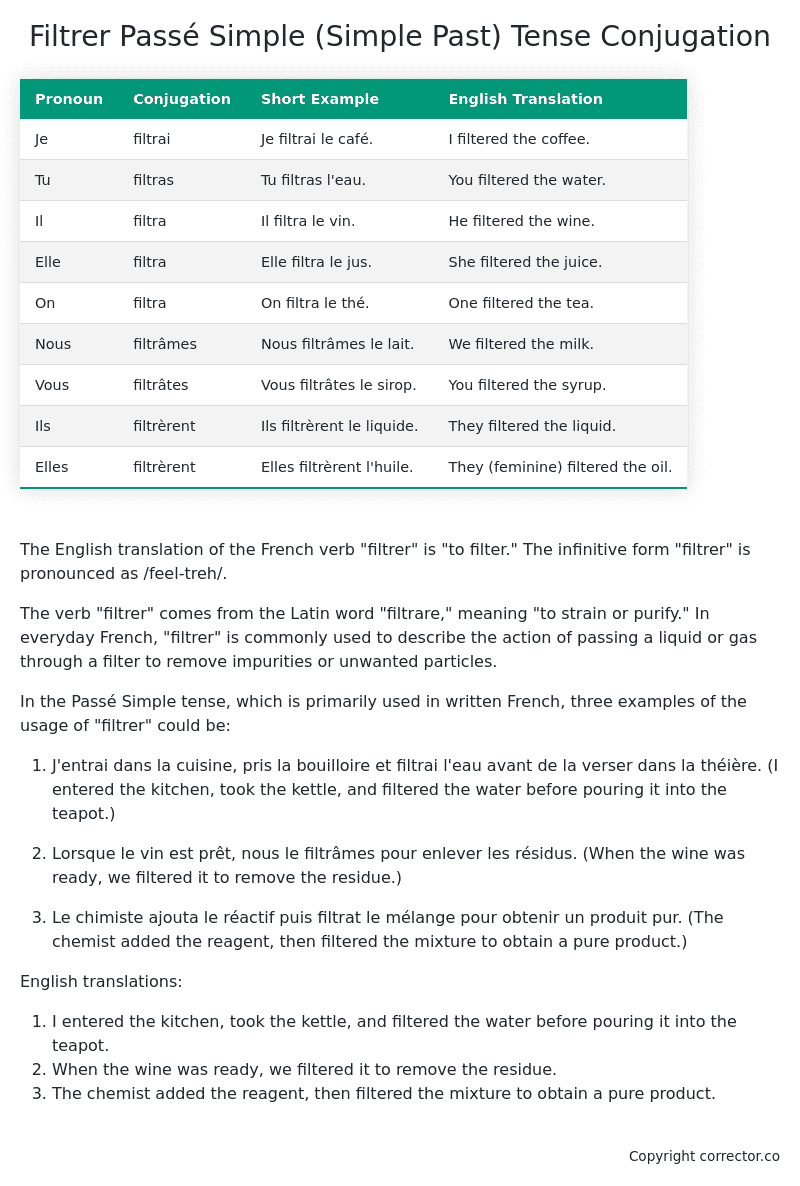Passé Simple (Simple Past) Tense Conjugation of the French Verb filtrer
Introduction to the verb filtrer
The English translation of the French verb “filtrer” is “to filter.” The infinitive form “filtrer” is pronounced as /feel-treh/.
The verb “filtrer” comes from the Latin word “filtrare,” meaning “to strain or purify.” In everyday French, “filtrer” is commonly used to describe the action of passing a liquid or gas through a filter to remove impurities or unwanted particles.
In the Passé Simple tense, which is primarily used in written French, three examples of the usage of “filtrer” could be:
-
J’entrai dans la cuisine, pris la bouilloire et filtrai l’eau avant de la verser dans la théière.
(I entered the kitchen, took the kettle, and filtered the water before pouring it into the teapot.) -
Lorsque le vin est prêt, nous le filtrâmes pour enlever les résidus.
(When the wine was ready, we filtered it to remove the residue.) -
Le chimiste ajouta le réactif puis filtrat le mélange pour obtenir un produit pur.
(The chemist added the reagent, then filtered the mixture to obtain a pure product.)
English translations:
- I entered the kitchen, took the kettle, and filtered the water before pouring it into the teapot.
- When the wine was ready, we filtered it to remove the residue.
- The chemist added the reagent, then filtered the mixture to obtain a pure product.
Table of the Passé Simple (Simple Past) Tense Conjugation of filtrer
| Pronoun | Conjugation | Short Example | English Translation |
|---|---|---|---|
| Je | filtrai | Je filtrai le café. | I filtered the coffee. |
| Tu | filtras | Tu filtras l’eau. | You filtered the water. |
| Il | filtra | Il filtra le vin. | He filtered the wine. |
| Elle | filtra | Elle filtra le jus. | She filtered the juice. |
| On | filtra | On filtra le thé. | One filtered the tea. |
| Nous | filtrâmes | Nous filtrâmes le lait. | We filtered the milk. |
| Vous | filtrâtes | Vous filtrâtes le sirop. | You filtered the syrup. |
| Ils | filtrèrent | Ils filtrèrent le liquide. | They filtered the liquid. |
| Elles | filtrèrent | Elles filtrèrent l’huile. | They (feminine) filtered the oil. |
Other Conjugations for Filtrer.
Le Present (Present Tense) Conjugation of the French Verb filtrer
Imparfait (Imperfect) Tense Conjugation of the French Verb filtrer
Passé Simple (Simple Past) Tense Conjugation of the French Verb filtrer (You’re reading it right now!)
Passé Composé (Present Perfect) Tense Conjugation of the French Verb filtrer
Futur Simple (Simple Future) Tense Conjugation of the French Verb filtrer
Futur Proche (Near Future) Tense Conjugation of the French Verb filtrer
Plus-que-parfait (Pluperfect) Tense Conjugation of the French Verb filtrer
Passé Antérieur (Past Anterior) Tense Conjugation of the French Verb filtrer
Futur Antérieur (Future Anterior) Tense Conjugation of the French Verb filtrer
Subjonctif Présent (Subjunctive Present) Tense Conjugation of the French Verb filtrer
Subjonctif Passé (Subjunctive Past) Tense Conjugation of the French Verb filtrer
Subjonctif Imparfait (Subjunctive Imperfect) Tense Conjugation of the French Verb filtrer
Subjonctif Plus-que-parfait (Subjunctive Pluperfect) Tense Conjugation of the French Verb filtrer
Conditionnel Présent (Conditional Present) Tense Conjugation of the French Verb filtrer
Conditionnel Passé (Conditional Past) Tense Conjugation of the French Verb filtrer
Conditionnel Passé II (Conditional Past II) Tense Conjugation of the French Verb filtrer
L’impératif Présent (Imperative Present) Tense Conjugation of the French Verb filtrer
L’impératif Passé (Imperative Past) Tense Conjugation of the French Verb filtrer
L’infinitif Présent (Infinitive Present) Tense Conjugation of the French Verb filtrer
L’infinitif Passé (Infinitive Past) Tense Conjugation of the French Verb filtrer
Le Participe Présent (Present Participle) Tense Conjugation of the French Verb filtrer
Le Participe Passé (Past Participle) Tense Conjugation of the French Verb filtrer
Struggling with French verbs or the language in general? Why not use our free French Grammar Checker – no registration required!
Get a FREE Download Study Sheet of this Conjugation 🔥
Simply right click the image below, click “save image” and get your free reference for the filtrer Passé Simple tense conjugation!

Filtrer – About the French Passé Simple (Simple Past) Tense
Formation
Usage
Narration
Historical Context
Interactions with other tenses
Passé Composé
Imparfait
Conditional and Subjunctive
Summary
I hope you enjoyed this article on the verb filtrer. Still in a learning mood? Check out another TOTALLY random French verb conjugation!


